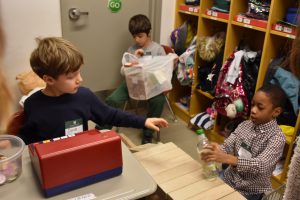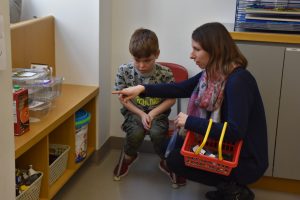
One morning, Jamie Kruger and Jordan Thaler’s classroom quietly transformed. The cubbies became a checkout line complete with cash register, the teacher’s desk turned into a fruit stand, and desks were pushed together to create a sushi station. And it was then that the Room 217 Supermarket – as students officially named it – was open for business. Students handed out bags of tokens, the monetary system accepted by the mart, to “customers” (aka faculty and staff) upon entering.
So what does a supermarket have to do with education? As it turns out, a lot. What looks like a fun project (and is) is an example of Project-Based Learning. According to Amy Mayer, CEO of friEdTechnology, “In project-based learning, the projects only serve as an infrastructure to allow users to play, experiment, use simulations, address authentic issues, and work with relevant peers and community members in pursuit of knowledge.” Project-Based Learning can be even more important for students with learning differences.
 The class started the project with research, visiting a neighborhood grocery store to take notes of the layout as well as prices of items. Next, students collected clean containers from home to use as merchandise for their supermarket. Then, they decided on sections of their store, such as dairy products and cereals, organizing the goods accordingly.
The class started the project with research, visiting a neighborhood grocery store to take notes of the layout as well as prices of items. Next, students collected clean containers from home to use as merchandise for their supermarket. Then, they decided on sections of their store, such as dairy products and cereals, organizing the goods accordingly.
“I think it’s critical because a lot of the times the children can’t always tell us what they know, but they can show us,” said Donna Logue, director of the Lower School. For example, one student arranged their assigned display of products by featuring the most prominent items on a shelf without any direction to do so. According to Logue, although that showed he understood why that was important, he would not have been able to articulate why. “Another reason these projects are so rich,” she continued, “is that they not only integrate skills they’re developing in other subjects but also show us where some of the gaps in their understanding are.”
The supermarket incorporated all major subject areas including reading, mathematics, writing, social-emotional learning, research, and social studies. And perhaps most critically, by undertaking such a large and collaborative project, executive functioning skills.
“Throughout the process of researching, preparing, creating, executing and reflecting, the students grew both individually and as a classroom community,” said Ms. Kruger. “It was incredible to witness the supermarket really go from my vision to their creation.”
